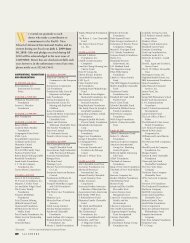Download Current Issue - SAIS
Download Current Issue - SAIS
Download Current Issue - SAIS
Create successful ePaper yourself
Turn your PDF publications into a flip-book with our unique Google optimized e-Paper software.
Chinese Government and Politics to<br />
Game Theory to Modernity and World<br />
Social Thought. Students feel the pressure<br />
of adjusting to classroom immersion<br />
in their target languages—but,<br />
like students in previous years, they<br />
will discover internal resources they<br />
never knew they had. The fruit of<br />
their struggles will be an augmented<br />
repertoire of fresh ways of conceptualizing<br />
both the world around them and,<br />
even more crucially, the human beings<br />
around them—including their confoundingly<br />
other, and stubborn, views<br />
of the world and how it should be.<br />
Turning to the <strong>SAIS</strong> “Year of Agriculture”<br />
theme, last year and this year<br />
have seen field trips and research dedicated<br />
to agriculture—not surprising<br />
in a country where more than a third<br />
of the population is still primarily<br />
engaged in growing food.<br />
Last spring, Professor Adam Webb<br />
led a field trip for his Politics of Rural<br />
Development class to a village in<br />
nearby Anhui Province, where students<br />
interviewed farmers and spent<br />
the night in locals’ homes. This year<br />
Professor Zhao Shudong will again<br />
lead students on field trips to the<br />
northern part of Jiangsu Province to<br />
see how agricultural policies affect<br />
farmers. And second-year master of<br />
arts in International Studies student<br />
Shirlene Yee N’12 will be conducting<br />
field research in Taiwan on various<br />
aspects of agriculture, including<br />
the impact of cross-Strait policies on<br />
farmers’ livelihoods and on the everdeepening<br />
ties between Taiwan and<br />
the mainland.<br />
Personally, I could not be more<br />
thrilled to be the new American codirector<br />
of this ever-more-venerable<br />
institution. And yet, the accumulation<br />
of years—25 under our belts, now<br />
into a 26th—has done nothing to dim<br />
the shine of the radical idea made real<br />
For those of us engaged in the mission of education, it is our<br />
great fortune to enjoy in autumn a second spring: a time not only<br />
of sowing but also of blossoming as we embark on another year<br />
of exploration and learning.<br />
by JHU President Steven Muller and<br />
Nanjing University President Kuang<br />
Yaming. If anything, as Sino-Western<br />
educational opportunities continue to<br />
expand and as prospective students<br />
have more and more options, the<br />
unique advantages of the HNC as a<br />
place where Chinese and international<br />
Year of<br />
Agriculture<br />
at<strong>SAIS</strong><br />
Hopkins<br />
Scholars at<br />
HNC<br />
Students are not the only<br />
ones seeking to understand<br />
the new global balance<br />
with Asia. Academics<br />
are also finding ways<br />
that China influences<br />
their fields of study. In this vein, the<br />
Hopkins-Nanjing Center is pleased<br />
to host the Hopkins Scholars Program<br />
in conjunction with the Foreign<br />
Policy Institute (FPI) at <strong>SAIS</strong>.<br />
Born of a recognized need for highquality<br />
individual and collaborative<br />
research between U.S.-based scholars<br />
and the rest of the world, this<br />
program will encourage comparative<br />
analyses and interdisciplinary projects<br />
in Nanjing.<br />
Two scholars will be selected by<br />
an academic committee to take up<br />
residence and pursue their topics<br />
of study at the HNC. This initiative<br />
will also bring two in-depth research<br />
projects and new discussions to<br />
the center, contributing to the<br />
intellectual stimulation of other<br />
scholars-in-residence, center faculty<br />
and students.<br />
Johns Hopkins University’s<br />
increased contribution to scholarly<br />
research at the HNC will create a<br />
pipeline for future faculty at the<br />
center, in collaboration with the FPI.<br />
This is an important step in informing<br />
the academic and practitioner<br />
communities of the resources that<br />
exist in Nanjing. The ultimate goal is<br />
to feature the center as a place to conduct<br />
research and to share expertise<br />
on and in China.<br />
The Hopkins Scholars Program<br />
was made possible by the university’s<br />
Benjamin and Rhea Yeung Center<br />
for Collaborative China Studies,<br />
which seeks to deepen understanding<br />
between the United States and China<br />
through collaboration among the<br />
various Johns Hopkins schools and<br />
academic programs. —Emily Kessler<br />
2011–2012 69



